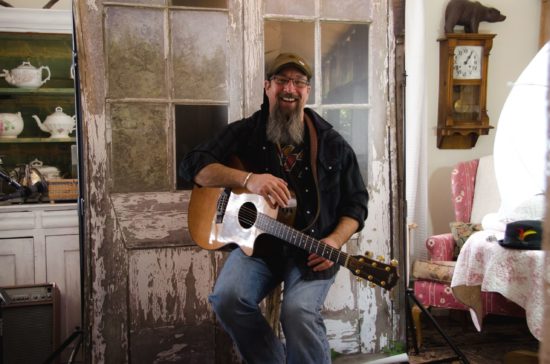My new album Lean into the Letter chronicles an amazing journey that started with the discovery of a letter sent in 1958. In 1914 when my Great Grandmother Sadie Friedman was 13, she was put on a ship to the United States alone to live with distant relatives in New York. She left 12 siblings in Poland and, as far as we knew, her entire family was murdered by Nazis in the Holocaust.
A few years ago, we discovered a purse that belonged to Sadie in the back of a drawer; it had been there since her death in 1975. In the purse was an envelope postmarked 1958- sent from Israel . It was written in Yiddish and after having it translated we discovered that it was from Sadie’s nephew, Jakob Nistel. Jakob described leaving his village in Poland one morning for work and when he returned in the evening, his whole village, extended family, wife and three children had been rounded up by the Nazis and sent to an extermination camp. He never saw them again. Jakob was able to evade the Nazis by hiding in a barn and eventually living underground until the end of the war. In his letters he writes of his devastation, loneliness, anger, faith and longing for his family.
Finding that we had a relative who survived the Holocaust was mindboggling, but even more lifechanging was through the magic of the internet we were able to locate Jakob’s family in Israel. We learned that after Jakob’s devastating loss in Poland, he met and married a woman while in hiding with whom he immigrated to Israel. The couple had three sons, and we were able to contact Jakob’s youngest granddaughter of his youngest son. My mother, brother, cousins and I soon traveled to meet our newly discovered family in Israel to spend some time exploring this historic, religiously and politically tense nation.
The songs that compose Lean into the Letter thread together my thoughts and emotions regarding Jakob, his survival in the face of horrific loss, his ongoing and unshakable faith, our discovery of and joy for new family, and ideas of resistance, depression, loss and anger in the context of historic and volatile conflicts that permeate the Holy Land.
This collection of songs began as an extremely personal construct and initially was never intended for release to a broad audience; but in the process of recording, and with the encouragement of family, these lyrics began to take on a more universal meaning in light of the current political and social climate we find ourselves in today. I now see Lean into the Letter not only as a personal memorial to Jakob Nistel and the family we lost in the Holocaust but as a commemoration of all the victims of that terrible regime. I hope Lean into the Letter can serve as a reminder of what words and deeds can become.
This album was recorded at Luxtone studios in Boise Idaho. Brandon Wallace, who produced it, was instrumental in transforming this collection of songs -adhered by an idea- into the album that it is. His partnership was integral to pushing these songs into a more modern guitar-driven sound than my past material, while still retaining the acoustic vibe that is such a centerpiece to my music.
For me songwriting is an intrinsic process. I am not a student of music nor a student of songwriting but instead have learned my craft through repetition and experimentation. As with many songwriters, I try to make sense of my world through word and melody. I have always felt most successful when I am able to freeze an image or feeling in time and space. But how does one write about topics of the survival of a family member you thought dead, when at the same time this letter confirms that nearly an entire branch of your family tree is wiped out, victims of the Holocaust? How can one ever understand the loss of that survivor? How can one even come close? I chose to focus on how Jakobs words troubled or enriched me.
The first time I read Jakob’s letter to my Great Grandmother what I noted most was not his anger, though that was evident, nor his desperation for connection with his lost family but his faith. In his letter he writes of leaving home for work one morning and when he returned to his village in the evening, finding that everyone has been rounded up by the Nazis and sent to the Extermination Camps. Everyone. His wife, his 3 sons, his mother and father, aunts, uncles, friends, everyone. How does one go on after such a loss? How does one find meaning? For Jakob it was his Faith. In the same breath he curses Hitler’s name and yet praises God. How does he not curse both? How does he go on to help build his new community in Israel?
How does one write a song about that? Focus on Faith.
In his letter Jakob tells my Great grandmother that her brother chose to jump from the cattle cars and died in an attempt to escape the Nazis rather than allow them to control his fate. How does one write a song about that? I focused on the acts of resistance that is often overlooked during that terrible period and see it as a defiant state against the current nationalism that threatens us today.
How do you write a song about meeting family whom you thought couldn’t possibly exist, when your mother sees the face of her grandmother in the face of a stranger? I focused on how reading words and of his experiences make me responsible to act as similar themes of hatred continue.
How does one measure themselves when confronted with such hardship? I wrote of adequacy and doubt.
When walking the streets of Old Jerusalem, where all the holy sites are guarded by soldiers and one wonders how can religion account for such conflict, I wrote about this irony.
When it seems so obvious that people use religion and nationalism as a weapon to hurt others and insulate themselves from their own wrongdoing, I wrote about anger.
When it seems that one heartbreaking loss can be the catalyst for isolation and harbouring emotional pain, I wrote about defeat.
When one finds that after 2000 years, war and political oppression continue in new guises, I wrote of history repeating.
When one finds presence and comfort in culture and tradition, I wrote of love.
When one finds that ones creative compass no longer points north, I wrote of loss.
When one realizes what the loss of a parent or child but inevitably leave you with, I wrote of being alone.
And when one must simply go on with the motions of daily life, I wrote of enduring.
I invite you to listen to Lean into the Letter and judge for yourselves whether I have been successful.
Lee Penn Sky is a folk artist that is soon to capture you with their storytelling abilities. You can listen to the first single off the album, “Worry About Gomorrah” above and find Lee Penn Sky’s music here.








